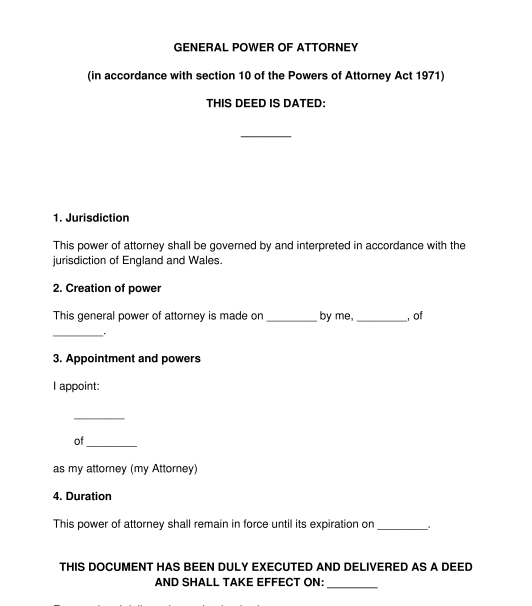 08/11/2025
08/11/2025

Answer a few questions and your document is created automatically.

Your document is ready! You will receive it in Word and PDF formats. You will be able to modify it.

 08/11/2025
08/11/2025
 Word and PDF
Word and PDF
 1 page
1 page
An ordinary power of attorney is a document that gives authority to another person or corporate body to act on behalf of somebody else in relation to their property and finances. This ordinary power of attorney should be used in England and Wales.
Different power of attorney documents are used in Northern Ireland and Scotland.
An power of attorney can be created as a:
A lasting power of attorney will come into effect once the donor loses capacity. An application for this type of power of attorney is made online through the government. A lasting power of attorney can grant an attorney the authority to deal with:
An ordinary power of attorney grants an attorney the authority to deal with a donor's financial and property affairs only. It will be revoked if the donor loses capacity.
Yes, there are certain circumstances where a power of attorney may be required. For example, formal legal processes (such as property transactions) may only be carried out on behalf of a person or body where there is a valid power of attorney in place. Banks and other entities may stipulate that a power of attorney is a requirement when liaising with a third party in relation to a person's finances.
A donor is the term used to describe the person making the power of attorney (the person who is granting the powers).
Capacity refers to the ability of a person to make decisions. A person lacks capacity if they are unable to make decisions for themselves because of an impairment of, or disturbance in the functioning of the mind or brain.
A power of attorney cannot:
Both of the parties should have capacity. This means each party must have the ability to make and understand decisions.
The donor should consider the credentials of the proposed attorney, such as whether they are trustworthy and have sufficient understanding of their proposed role. The attorney should not be bankrupt.
A donor can be:
An attorney can be:
It is also possible to appoint more than one attorney.
Any natural party to a power of attorney must not lack capacity. This means both parties should be able to make and understand decisions.
In theory, a person under the age of 18 may make a power of attorney, but their capacity and ability to understand the power of attorney will need to be assessed on an individual basis.
An attorney should not be bankrupt.
A power of attorney can state that the powers will remain until either:
A power of attorney can be described as irrevocable, meaning the donor cannot terminate it without the attorney's consent and it will not be subjected to most of the usual revocation rules. Under the usual rules, a power of attorney will be revoked:
Once the power of attorney has been finalised it must be signed and dated. It must be executed as a deed by the donor, meaning it must be signed in the presence of a witness.
If the donor is a corporate entity, the person signing must have the authority to sign the deed. The signatory will usually be:
The document will not be reviewed by a lawyer to ensure that the legal content applies to the personal situation of the parties. To review the particulars of any final agreement, it will be necessary to instruct a lawyer. For assistance finalising, reviewing and executing a deed, advice should be sought from a lawyer who is regulated by an approved regulator in the legal services sector. It is possible to search for a lawyer using the Law Society – find a solicitor webpage.
The document must be signed and dated by the donor. As the document takes the form of a deed, the signature of the donor must be witnessed. The witness should:
An attorney must:
A power of attorney should:
The legal provision application to a power of attorney is The Powers of Attorney Act 1971.
The main legal provisions that govern the execution of deeds in England and Wales are:
You fill out a form. The document is created before your eyes as you respond to the questions.
At the end, you receive it in Word and PDF formats. You can modify it and reuse it.
A guide to help you: Signing Documents in England and Wales
Country: United Kingdom